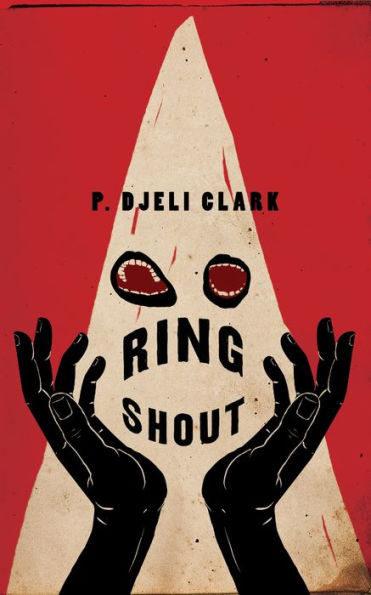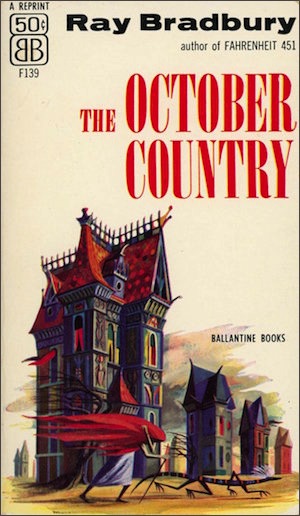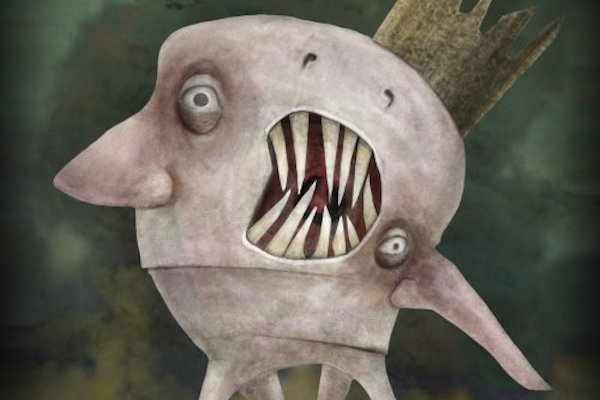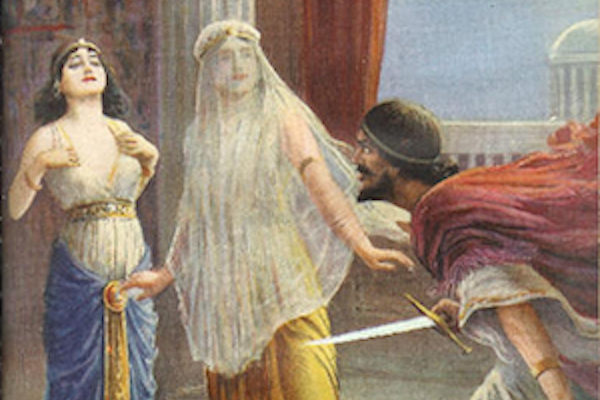Welcome back to Reading the Weird, in which we get girl cooties all over weird fiction, cosmic horror, and Lovecraftiana—from its historical roots through its most recent branches.
This week, we cover Ray Bradbury’s “The Man Upstairs,” first published in the March 1947 issue of Harper’s Magazine. Spoilers ahead.
Douglas’s Grandpa fondly calls the eleven-year old a “coldblooded little pepper.” Curiosity rules the boy, who once unflinchingly viewed a gory train accident. Less dramatically, he enjoys watching Grandma eviscerate chickens and lay out their organs in pans of water and wrapping paper. If he’s quiet, she lets him observe the magical surgery, but Douglas can’t always swallow his questions. He asks Grandma if he’s like the chickens inside; momentarily indulgent, she replies that he is. Further questioning, especially about big-bellied Lucie Williams down the street (how is she different from big-bellied Grandpa?), puts an end to Grandma’s forbearance.
A jangling bell calls Douglas to the boarding house’s front door. He opens it to a tall, thin man with cold gray eyes. The man carries a suitcase, briefcase and umbrella; on his hands are thick gray gloves, and on his head a “horribly new” straw hat. He wants to rent the upstairs room. Instant dislike makes Douglas say it’s already taken, but Grandma hushes him and shows the man upstairs.
Grandma sends Douglas up with fresh linens. Just by standing there “tall, tall,” his umbrella leaning against a wall like “a dead bat with dark wings folded,” the stranger transforms the room from flowery brightness to a place “alien and brittle.” He rewards Douglas’s errand with ten new copper pennies. Douglas thanks him but adds he’ll have to get the pennies changed for a dime—it’s dimes he’s saving up.
To lunch the man brings his own wooden cutlery. Douglas annoys him by rattling his silverware, then by doing a trick with a silver fork.
The new boarder’s name is Koberman. He works nights, then sleeps “all through the dreaming hot daytime.” When Grandma’s away, Douglas makes as much noise as possible, even screaming outside Koberman’s room, but Koberman never wakes, never complains. Douglas begins to nurse towards him “a pure white flame of hatred… with a steady, unflickering beauty.”
On the landing between floors is a window framed by six-inch colored panes. Early mornings, when the sun strikes through the window, Douglas likes to peer through each pane and see the world outside dyed blue, red, yellow, violet. One morning he watches through the red pane as Koberman returns from work. Under the overlaid tint, Koberman’s clothes and flesh seem to melt away, momentarily revealing his insides.
Koberman catches Douglas spying and confronts him angrily. Douglas explains he likes to look through the panes and see “all kinds of worlds. Blue ones, red ones, yellow ones. All different.” Koberman wipes a pale, sweating face and pretends to laugh. “Yes,” he says before retreating to his room. “All kinds of worlds. All different.”
Soon afterwards, while Douglas plays in the backyard, someone throws his basketball through the landing window. Grandma blames Douglas and gives him a whipping. The real culprit, Douglas knows, is the new boarder, and he soothes himself with thoughts of vengeance. He also saves three shards of colored glass for future use.
Grandpa comes home from his newspaper office. Douglas quizzes him: “What if a man was different inside, but still walked around alive?” Grandpa supposes such a man couldn’t be quite human. The family and boarders sit down to dinner, Koberman “silent and sullen.” Grandpa brings up the recent peculiar deaths in town. One young woman has disappeared; another was found dead, covered with weird tattoos. Mr. Britz suggests a vampire may be responsible, in which case one could kill him with silver bullets, anything silver for that matter. Grandma’s incredulous. Grandpa muses that no one knows what a vampire might really be. Maybe all monsters are just people. People “who do things.” Koberman leaves the table.
Buy the Book


Ring Shout
Next day, while Grandma’s shopping, Douglas opens Koberman’s door with the passkey and performs experiments. Poked with a silver fork, the sleeping man groans. Viewed through a shard of blue glass, his closed eyes look open, dark and hungry. His pajamas seem to dissolve, and Douglas sees an interior stuffed with strange shapes. Where does Koberman work at night, Douglas asks. In a red world, or a green or a yellow one? Receiving no answer, he fetches Grandma’s biggest, sharpest knife.
Grandma is busy making pies when Douglas shows her weird objects: An orange square with four square blue tubes attached; a pink chain with a purple triangle at one end; other shapes, all “pliable, resilient…as if they were made out of gelatin.” She pays little attention. She was wrong, he tells her: people aren’t all the same inside. Then he carries his piggybank upstairs.
Later Douglas leads Grandpa to Koberman’s room to see something “not nice” but “interesting.” Grandpa immediately summons the authorities. With characteristic sangfroid, Douglas watches the coroner examine Koberman’s naked body. Grandpa wants to take Douglas away to “forget this whole ghastly affair,” but Douglas says he doesn’t see anything bad, doesn’t feel bad.
The coroner confirms that Koberman’s dead, and yes, he’s seen the things Douglas set aside in pans of water and wrapping paper. Douglas’s act was “a mercy,” not murder, and better kept secret. Was Koberman a vampire? The coroner doesn’t know, but he knows the man wasn’t human. Didn’t Douglas say he went on living even after eviscerated? So what actually killed him?
The coroner opens up the body Douglas carefully sewed together, like Grandma sewed chickens. Inside is $6.70 in silver dimes from Douglas’s piggybank. Douglas made a “wise investment,” the coroner opines as he sews Koberman back up, leaving the dimes inside.
What’s Cyclopean: Grandma has a way with words: “A darning-needle dragonfly is coming by some day and sew up your mouth.”
The Degenerate Dutch: Douglas imagines that Grandma’s silver shakers contain “showers of mummy-dust and pulverized Indian bones,” substances of imperial grave-robbing wonder.
Weirdbuilding: Some kinds of monsters, it doesn’t help to name. And some kinds of monsters don’t get much benefit from not matching up with existing categories.
Libronomicon: Vampires hate silver. Mr. Britz read it in a book somewhere, once. Sure he did.
Madness Takes Its Toll: No madness this week, save the peculiar psychology of 11-year-old boys.
Anne’s Commentary
Vampires, Grandma scoffs. In the thoroughly modern year of 1927, the notion’s ridiculous. It’s Mr. Britz who suggests an undead bloodsucker could be behind the strange deaths in town. Having just met Britz, the reader doesn’t know whether to interpret his utterances as tongue-in-cheek jest or the credulity of a true believer. A seasoned newspaper editor, Grandpa takes words seriously. No one knows what a “vampire” actually is, so why pretend to understand its unnatural history? Most likely all the legendary monsters are just people “who do things.” Bad things. Monstrous things, but only in a figurative sense.
Douglas, listening to the grown-ups talk, hearing that Britz got his vamp-bane information from a book, and watching Koberman’s reactions, has no trouble believing in vampires. He’s been further primed for belief by all his interactions with the new boarder. He immediately sensed wrongness in the man and wrongness leaching from him into a room previously welcoming, to leave it “alien and brittle.” With a child’s simultaneous fascination with the unusual and wariness of the abnormal, he catalogs the Koberman idiosyncrasies his elders overlook. What’s with the aversion to silver demonstrated by his wooden cutlery and copper coins? Why does he sleep all day, as unresponsive to racket as the dead? Why is he so too-tall? Why is his straw hat terrible in its newness? Why does his umbrella remind Douglas of a dead bat?
Even before colored glass reveals Koberman’s internal weirdness and he frames Douglas for breaking the window, Douglas hates the man upstairs. To paraphrase Poe’s “Annabel Lee,” he hates Koberman with a hate that is more than hate, with an abhorrence Bradbury describes as a “pure white flame” burning with “a steady, unflickering beauty.”
That’s hatred on a heroic scale. With such a torch blazing inside him, Douglas becomes a juvenile Crusader, the implacable enemy of things that should not be. He’s one hell of a kid—look how he selflessly gives up his dime-hoard to save his neighbors, maybe all humanity!
I don’t know if I like Douglas.
I used to, when I first read The October Country. These many years later, I’ve developed more sympathy for the monsters and less for their righteous destroyers. Not that Douglas is self-righteous. He has a score to settle with Koberman over the broken window, but it’s more curiosity than vengefulness that drives Douglas to take his experiments with the sleeping monster to full-scale vivisection—that “coldblooded” curiosity that makes Grandpa call him a “queer duck,” if admirably fearless, a son befitting his military-man father.
Where is Douglas’s father, and his mother for that matter? We know he came a year earlier to live with his grandparents. Does that mean his parents are dead? On assignment overseas? Neglectful? Probably not the last, since Grandpa says Douglas was very close to his father. So I’ll opt for Douglas being a recent orphan, before whom Grandpa skirts mention of his son’s death.
Douglas may honor Grandpa’s sensitivity by his long pause before launching into discussion of hypothetical men without normal innards. How “coldblooded” is the kid? To the point of psychopathy? Grandpa can’t forget Douglas’s avid and undistressed reaction to a nasty train accident. He doesn’t want to make too much of that, however, or of Douglas’s delight in Grandma’s chicken butchery. Should we the readers make much of it in his stead?
I have a feeling Bradbury doesn’t mean for us to view Douglas as a budding serial killer or Dr. Moreau. I have a feeling he agrees with the coroner that what Douglas did to Koberman was not murder but justifiable xenocide.
I still don’t know if I like Douglas. Koberman is quite the intriguing xenomorph, taken from us xenophiles too soon. It’s possible, even probable, that Koberman is the predator responsible for the town’s dead and missing. The condition of Miss Kaplan’s corpse throws particular suspicion in his way. Authorities have determined no cause of death, unless she succumbed to those “funny kinds of tattoos all over her.” Not bruises, not wounds, tattoos. Could these marks resemble some of the organelles Douglas pulled out of Koberman? Organelles gelatinous enough to leave colorful impressions on a victim’s skin?
Even if the coroner can make a connection between the “tattoos” and Koberman’s pan-soaked and paper-nestled guts, Douglas executed Koberman before any such damning evidence had been revealed. He killed him because Koberman was way too other to live, something from one of those other worlds the colored glass revealed, something that didn’t deserve to dwell at Grandpa and Grandma’s, in a room once rendered flowery and bright by an indubitably human Miss Sandlowe.
At the end of this long summer day at the boarding house, Grandpa assumes that Douglas has been traumatized by the “whole ghastly affair.” In truth, it’s Grandpa and the other adults who have been traumatized. Douglas doesn’t see anything bad in the scene of Koberman’s death. He doesn’t feel bad.
Does that make him a psychopath or a kid at the far end of normal on the resilience scale?
I still don’t know.
Ruthanna’s Commentary
Paying guests are a vulnerability. Whether in an old-fashioned boarding house or the room you rent out online, there’s risk offering a place to strangers. When there’s money involved, you can’t count on the laws of hospitality to keep the fae at bay. Though I note Mr. Koberman doesn’t cause any mysterious deaths in-house.
Assuming he causes them at all. The circumstantial evidence is strong, but all we know for sure is that he’s full of geometry, doesn’t want anyone to know, and does an honestly terrible job of covering up. I can only assume he’s a relatively young thing-that-shall-not-be-named, because he practically walks around wearing a “stab me with silver” sign taped to his forehead.
The core question here is: how many monsters are there in this story? There’s Koberman, sure. But while many 11-year-old boys would be fascinated by dead bodies and the vagaries of living ones, there’s something… off… about Douglas. Like in Jackson’s “The Witch,” his macabre interests go in directions that just might lead off a cliff. Then there’s the lack of clarity around why he lives with Grandma and Grandpa now—the logical inference is that his parents died, but “so close to him before you came here to live last year” seems differently-circuitous than a man trying not to talk about his son’s or son-in-law’s death. Then there’s the way Douglas keeps asking about his own insides. Sure, Grandma says they’re like a chicken’s, but she hasn’t checked. And he doesn’t point the glass at himself to compare. If you were a kid and had magic X-ray lenses, wouldn’t you at least try that?
This line jumps out: “Douglas stood off like a small mechanism whirring and watching with carefully microscopic eyes.” How much like that mechanism, do you figure?
The colored glass, by the way, seems like the training-wheels version of the machine in “From Beyond.” Other realities or other aspects of this reality, visible if you only know the right way to look. If you don’t look, are you safe from them, or can they still hurt you? How much of that risk do you want to take? How much of that risk are you willing to rent a room to?
Answering those questions might require naming things, or putting them in predictable categories. Grandpa warns us against such presumption, and he does so very oddly. You can’t say that vampires and hobgoblins and such might act one way or another, because they’re “people who do things.” If people are that inherently unpredictable, maybe we are the unnamable. Which makes the answer to “how many monsters” worrisomely high.
But then, Mr. Britz is right in his speculations. Maybe not in his labeling—we never do find out whether “vampire” is anything like correct—but in his prescription for dealing with Koberman. And it’s interesting that he lays it out right in front of the one guy sitting there with a wooden fork. He can’t be doing that accidentally, right? Maybe it’s meant as a threat, or teasing the weird guy who’s probably not a serial killer, or maybe he’s hoping Koberman will leave without him having to cut out his triangles. Maybe he figures, correctly, that someone else will go to the trouble so he doesn’t have to.
And then Douglas has to leave town. Again. Maybe something like this happened “last year” too. And maybe Douglas didn’t feel bad that time, either.
Next week, we start our new longread by fighting some truly monstrous “people who do things.” Join us for P. Djèlí Clark’s Ring Shout!
Ruthanna Emrys’ A Half-Built Garden comes out in July 2022. She is also the author of the Innsmouth Legacy series, including Winter Tide and Deep Roots. Her short story collection, Imperfect Commentaries, is available from Lethe Press. You can find some of her fiction, weird and otherwise, on Tor.com, most recently “The Word of Flesh and Soul.” Ruthanna is online on Twitter and Patreon, and offline in a mysterious manor house with her large, chaotic household—mostly mammalian—outside Washington DC.
Anne M. Pillsworth’s short story “The Madonna of the Abattoir” appears on Tor.com. Her young adult Mythos novel, Summoned, is available from Tor Teen along with sequel Fathomless. She lives in Edgewood, a Victorian trolley car suburb of Providence, Rhode Island, uncomfortably near Joseph Curwen’s underground laboratory.













